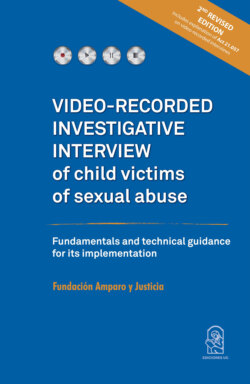Читать книгу Video-Recorded investigative interview of child victims of sexual abuse - Fundación Amparo y Justicia - Страница 3
На сайте Литреса книга снята с продажи.
ОглавлениеINDEX
COVER
INDEX
FOREWORD
INTRODUCTION
BACKGROUND I. The participation of child victims in criminal proceedings
1. Vulnerable victims and secondary victimization
2. The rights of child victims of crime
3. The experience of child victims of sexual abuse in the justice system
References
II. Testimony of child victims of sexual abuse
1. Specific issues related to sexual abuse
2. Findings in the study of child victims’ testimony
References
THE INVESTIGATIVE INTERVIEW
I. General aspects of the investigative interview
II. Differences between the investigative interview and other types of interviews
1. Expert evaluations
2. Taking of testimony
3. Clinical interviews
III. Benefits of the investigative interview
1. Benefits for criminal prosecution
2. Benefits for children / Regarding children and adolescents
3. Benefits for other participants in the criminal justice process
IV. Ideal time to conduct an investigative interview
V. Number of interviews
VI. Participants
1. People present in the interview room
2. Additional people who may be present in the interview room
3. People present in the observation room
VII. Stages of the interview process
1. Planning
2. Conducting the interview
3. Analysis
TECHNOLOGICAL AND INFRASTRUCTURAL ASPECTS I. Infrastructure and technological equipment
1. General facilities
2. Waiting room
3. Interview planning room
4. Interview room
5. Infrastructure and technology models
II. Storage and custody of the video-recorded investigative interview
1. Storage of the recordings
2. Secure access to the recordings
References
THE INTERVIEWER AND BEST PRACTICES OF INVESTIGATIVE INTERVIEWING I. Interviewer profile
1. Professional training
2. Gender
3. Personal skills
II. Interviewer training process
1. General characteristics of the training programs
2. Contents of the training courses
3. Key elements of effective training programs
II. Interview protocols
1. Investigative interview protocols
2. NICHD protocol
References
USE OF THE INVESTIGATIVE INTERVIEW IN TRIALS I. Comparative models on the use of video-recorded investigative interviews in trials
1. Using an investigative interview video recording to replace a child’s testimony
2. Using an investigative interview video recording to replace the direct examination of a child
3. Using an investigative interview video recording as additional evidence, different from testimonial statements of the child
References
CHILDREN’S TESTIMONY
I. Difficulties in the participation of children in court hearings
II. Protective measures for children’s testimonies
III. Intermediation
1. The intermediary and its functions
2. The process of intermediation
3. Advantages of intermediation
IV. Pre-trial hearings
1. Pre-trial hearings
2. Advantages of pre-trial hearings
References
THE VIDEO-RECORDED INTERVIEWS ACT IN CHILE
I. Description of Act No. 21,057
II. Changes introduced by Act No. 21,05790
1. Complaint
2. Investigation
3. Court hearings
III. Other relevant aspects stipulated by the Act
1. Protective measures for children
2. Interviewer training and certification process
FINAL CONSIDERATIONS
ENDNOTES
